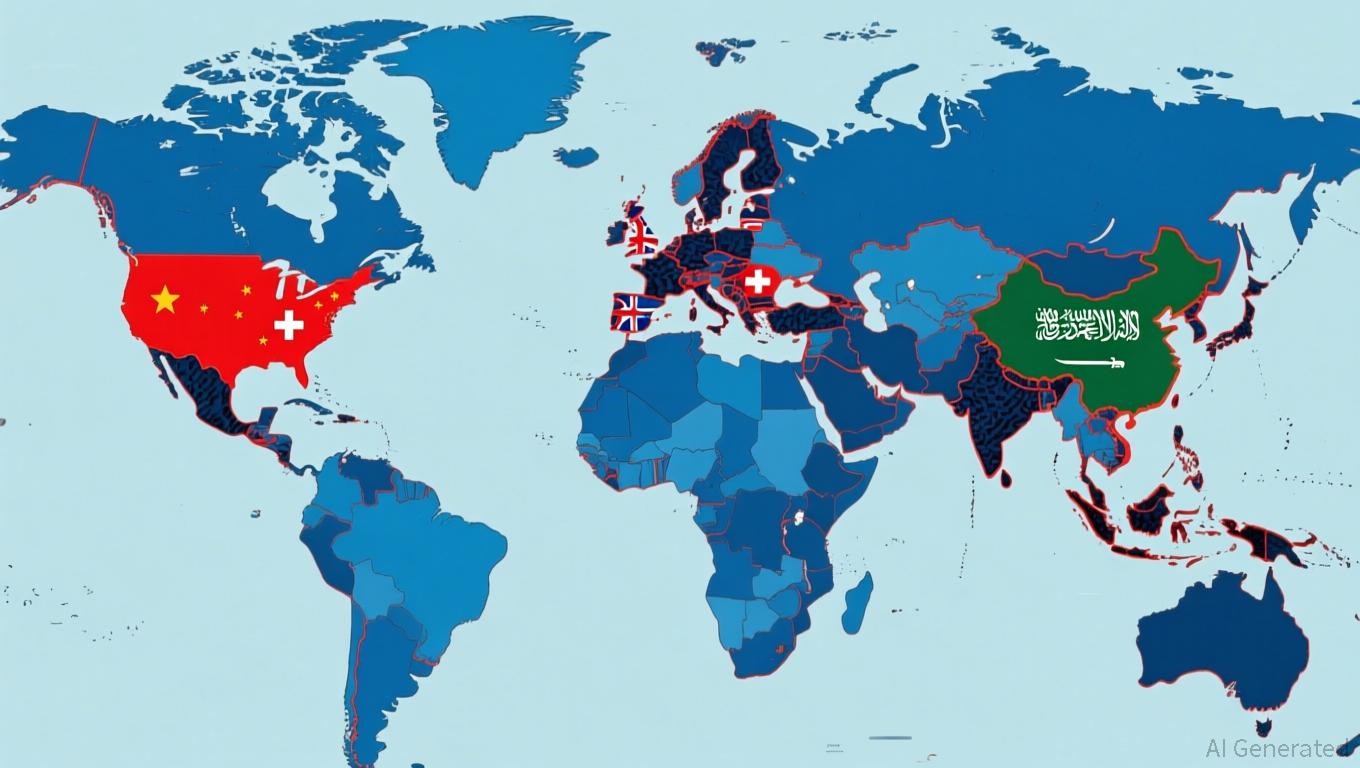UAE Invests $20 Million in Ethena: A Stablecoin Gateway Transforming International Finance
- M2 Capital's $20M ENA token investment supports UAE's digital asset infrastructure expansion through Ethena's synthetic stablecoin ecosystem. - Ethena's USDe ($13.2B market cap) uses delta-neutral hedging to generate yields, outperforming traditional stablecoins via staking and derivatives. - UAE's regulatory framework, including VARA and CARF, enables institutional adoption as Ethena partners with BlackRock and targets TradFi integration via iUSDe. - Strategic partnerships and $2B Mega Matrix backing hi

M2 Capital, the investment division of M2 Holdings based in the UAE, has pledged $20 million towards Ethena’s governance token,
Ethena’s USDe maintains its $1 value through a delta-neutral hedging approach, combining crypto collateral with short perpetual futures. The stablecoin’s market value has climbed to $13.2 billion, making it the third-largest crypto asset tied to the dollar. Its ability to generate returns via staking and derivatives sets it apart from conventional stablecoins like
The UAE’s regulatory landscape has played a crucial role in enabling these advancements. The nation has established a comprehensive framework involving organizations like the Securities and Commodities Authority (SCA), the Central Bank of the UAE, and Dubai’s Virtual Assets Regulatory Authority (VARA). These bodies have coordinated their oversight to simplify licensing and compliance, aligning with international standards such as the EU’s Markets in Crypto-Assets (MiCA) and the Financial Action Task Force (FATF) recommendations. This regulatory certainty has drawn other significant participants, including CZ’s family office YZi Labs, which recently raised its investment in Ethena Labs. The UAE’s forward-thinking stance, including the soon-to-be-launched Crypto-Asset Reporting Framework (CARF), is designed to boost transparency while preserving the country’s competitive advantage in the global crypto arena.
Ethena’s 2025 strategy involves extending its influence into traditional finance (TradFi). The protocol intends to introduce iUSDe, a product aimed at connecting crypto with mainstream financial markets, offering fixed-income portfolios an anticipated 20% yearly return. This project targets a $20 billion opportunity within TradFi, utilizing Ethena’s current infrastructure to attract asset managers, private funds, and institutional investors. The roadmap also features plans to support payments via Apple Pay and to launch a Telegram mini app to reach one billion users, reflecting its goal to make yield-generating digital assets accessible to a wider audience. These initiatives are backed by collaborations with BlackRock, Franklin Templeton, and Fidelity, indicating a shift in how established financial institutions perceive tokenized assets.
The partnership between M2 Capital and Ethena, along with Ethena’s strategic progress, highlights a broader movement of institutional participation in the Middle East. As the UAE cements its status as a leading crypto hub, the region is experiencing a blend of regulatory innovation, technological advancement, and increased capital flow. Ethena’s rapid growth, achieving a $13.2 billion USDe market cap in just over a year, showcases the disruptive potential of synthetic stablecoins in the financial sector. As the industry continues to evolve, the UAE’s regulatory leadership and Ethena’s product development are set to significantly influence the adoption of digital assets both regionally and globally.
Disclaimer: The content of this article solely reflects the author's opinion and does not represent the platform in any capacity. This article is not intended to serve as a reference for making investment decisions.
You may also like
Switzerland Delays Crypto Information Exchange Pending International Coordination
- Switzerland delays crypto tax data sharing with foreign nations until 2027, citing unresolved CARF partner agreements. - The OECD's 2022 framework requires member states to exchange crypto account details, but 75 countries including the EU and UK face implementation challenges. - Transitional measures ease compliance burdens for Swiss crypto firms while awaiting finalized international data-sharing protocols. - Major economies like the U.S., China, and Saudi Arabia remain outside CARF due to non-complian

Bitcoin Updates: SGX Addresses Offshore Perp Shortfall as Bitcoin Decline Increases Demand for Hedging
- SGX launched Bitcoin and Ethereum perpetual futures, becoming a first-mover in regulated onshore crypto derivatives to meet institutional demand. - The $187B/year perp market, dominated by Asia, now gains a regulated alternative to offshore platforms with SGX's 22.5-hour trading window. - Perps enable hedging during Bitcoin's 2025 downturn, with SGX's margin-call system prioritizing investor protection over instant liquidations. - Regulatory caution limits access to accredited investors, aligning with gl

Bitcoin News Update: Institutional ETF Adjustments Challenge Key Bitcoin Support Thresholds
- Analysts warn Bitcoin faces 25% drop risk if key support levels fail amid shifting institutional ETF dynamics. - Texas's $5M IBIT purchase highlights growing government interest, but ETFs fall short of direct BTC ownership criteria. - Technical analysis shows Bitcoin trapped in a broadening wedge pattern, with breakdown below $80,000 risking $53k decline. - Institutional rebalancing sees $66M IBIT outflows vs. $171M FBTC inflows, signaling tactical ETF rotation over accumulation. - Abu Dhabi's $238M ETF

XRP News Today: IMF Cautions That Rapid Tokenized Markets Could Intensify Crashes in the Absence of Regulation
- IMF warned tokenized markets like XRP could worsen flash crashes without regulation, citing risks from decentralized systems lacking traditional safeguards. - Report acknowledged tokenization's potential to cut cross-border payment costs but highlighted volatility risks from rapid liquidity loss seen in crypto markets. - SEC's approval of crypto ETFs signals growing institutional acceptance, though regulators emphasize oversight frameworks to mitigate systemic risks. - IMF proposed a global digital marke
